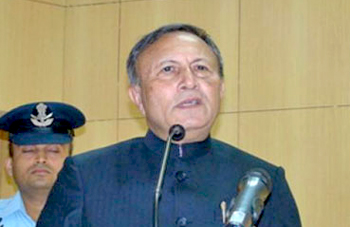Raipur, Jun 19: Chhattisgarh Governor Shekhar Dutt has resigned, official sources said Thursday, even as the BJP denied that governors appointed by the previous government had been told to go.
 A day after Uttar Pradesh Governor B.L. Joshi quit, Dutt submitted his resignation to President Pranab Mukherjee Wednesday, the sources in the Raj Bhavan at Raipur told IANS.
A day after Uttar Pradesh Governor B.L. Joshi quit, Dutt submitted his resignation to President Pranab Mukherjee Wednesday, the sources in the Raj Bhavan at Raipur told IANS.
But it was not immediately clear if the resignation had been accepted.
The ruling Bharatiya Janata Party clarified Thursday that no governor had been asked to quit.
"No governor has been asked to resign. The way the Congress party is trying to politicize the issue is not in good taste," BJP's Mukhtar Abbas Naqvi told the media here.
Assam Governor J.B. Patnaik, meanwhile, said he was not resigning from his post.
"How many times I have to say that I am not resigning?" Patnaik told the media after meeting Home Minister Rajnath Singh here.
"I did not have any talks about resigning. The meeting with the minister was not on (this) issue," he said.
The opposition has hit out at the Narendra Modi government amid persisting speculation that governors appointed by the Congress-led regime have been asked to put in their papers.
Dutt's resignation came as a surprise to most people in Chhattisgarh as he was reportedly not under any pressure to quit. The former defence secretary is also said to enjoy good relations with Chhattisgarh Chief Minister Raman Singh.
Despite Joshi's resignation and Dutt's reported exit, some governors have betrayed no signs of stepping down.
While Kerala Governor Sheila Dikshit Wednesday evaded questions on her next move, her West Bengal counterpart M.K. Narayanan said resignation was not on his mind.
Former National Security Advisor Narayanan and former Delhi chief minister Dikshit are among the governors who, media reports say, have been asked by Home Secretary Anil Goswami to quit.
Governors H.R. Bhardwaj (Karnataka), Kamla Beniwal (Gujarat), Margaret Alva (Rajasthan) and K. Sankaranarayanan (Maharashtra) are also said to be on the government's list of those it wants out of Raj Bhavans.





Comments
Add new comment